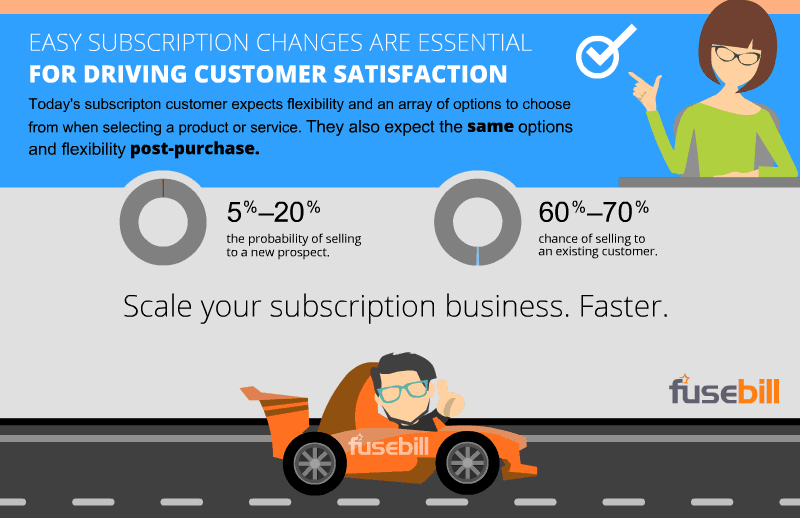Subscription businesses rarely have a one-size-fits-all option they offer to every customer at every stage of the customer lifecycle. Instead, they have an assortment of products, services, and features that can be offered depending on the wants and needs of customers.
But to tailor and bundle their options in unique and evolving ways—and to best serve their customers now and in the future—recurring billing businesses require catalog flexibility.
A flexible catalog enables a business to alter, add, and update products in real time as customer and market needs change. And while the products make up the catalog, a business’s plans represent its many bundled product offerings. These plans dictate how products behave within a subscription.
Plan flexibility is as essential as having that flexible catalog because customers—both potential and existing—expect you to modify your offerings, versus them modifying their needs.
To this end, it’s important for your business to offer variable subscription plans. The more you can tailor your contracts to customers’ needs, the greater your chances of winning—and keeping—their business.
Subscription plan flexibility for digital transformation
There’s a practical option for subscription businesses when it comes to both catalog and plan flexibility: adaptive subscription management and recurring billing software. This fintech solution benefits businesses in all industries and of all sizes, from startups to enterprises.
Adaptive billing manages all the components that enable the creation and delivery of unique subscription plans that appeal to your customers’ needs, both immediately, and as your offerings evolve. It also makes it seamless to migrate customers between plans or make customized changes on a granular level throughout their lifecycle with your company.

There are many different ways to perform recurring billing, from processes that are completely manual to those that are fully automated. But the more bare-bones you go, the more limitations your company will encounter. And without the flexibility of a more sophisticated system, problems can quickly arise.
An adaptive subscription billing platform is going to open up a lot more opportunities than just simplifying the billing process for your business. The flexibility of adaptive billing offers key benefits much earlier in the customer journey. And such agility can set the stage to reap the advantages of digital transformation.
Here are four ways your sales team can leverage tailored subscriptions to win new business.
1. Make subscription plan adjustments to make the sale.
Sometimes, your sales team needs to ‘sweeten the deal’ to bring a new customer on board. There are a number of different tactics that might come into play here, including a temporary price reduction or a free month to try out your product.
I’ve talked to clients in the past who could not make exceptions in their legacy billing tools though. If they made one tweak, it would have carried across all their subscriptions.
Billing flexibility with the right billing platform, on the other hand, opens an entirely new world—one that permits as many exceptions and unique offers as your sales and marketing teams can dream up.
And the more you can tweak your offerings to fit a customer’s need, the more your business comes off as the best solution for their needs. This is how digital transformation with the right billing fintech can bring you new customers.
2. Guarantee plan flexibility even after the sale.
Gone forever are the days of being locked into a plan indefinitely. One thing we know from the business landscape is to expect the unexpected. This is one reason many businesses have gravitated toward the subscription model versus the large, one-time purchases that were commonplace in the traditional sales model.
Customers’ needs change all the time. They might need to add to the number of users in their subscription, and as such will have to migrate to a more expensive plan. Or, they might be impacted by an economic downturn that forces them to reduce their number of users.
Maybe their user-count doesn’t change at all, but as their needs change, they realize they need more—or fewer—features offered in your catalog.
Whether your customers want to upgrade or downgrade their subscription, plan migration is seamless with the right billing and subscription management service in place. And plan flexibility that adapts to the customers’ needs is a critical selling point for winning new business—not to mention retaining and growing it.
For example, let’s say your sales team negotiates a contract with a customer. That contract is good for three years, and the terms are negotiated for your $1,000 Gold Plan with the customer paying annually.
However, halfway through the first year, the customer decides to make some changes. Perhaps he has decided the features in the $1,500 Platinum Plan are better suited to his business’s needs.
Unfortunately, if your business is working with a manual or legacy billing tools, it’s a messy process. You may need to cancel the original subscription first, refund the customer for half a year of that plan that was paid for but will be unused, and then create an entirely new subscription.
Finally, since the customer is starting the new plan halfway through the year, you’ll need to either discount the plan or credit their account into the following year. Confusing, right?
And with this complex process, a business can report ‘false churn’—when your information misrepresents what’s actually happening within your customer base.
False churn includes both false contraction and false expansion under that customer. If it’s not tracked properly, you’re going to see: “I lost $1,000, but I gained $1,500 on that same day.” Instead, what your business really wants to show is that recurring revenue from that customer grew by $500 in that plan.
From a reporting standpoint, a comprehensive billing platform aligns everything with accuracy. Improved customer experience and operational efficiencies are the hallmarks of digital transformation best practices.
3. Support subscription billing needs of any complexity.
Members of your sales team do not want to spend precious time working with potential customers, only to lose the sale because the customer isn’t the right fit. It happens, and it’s frustrating.
But imagine how much more frustrating it would be for your sales team to bring on a new customer that seems like a perfect fit for your business—only to realize that your billing system simply isn’t going to support their complex needs.
Because a modern billing platform allows for modifications at a granular level, your sales team can close that sale knowing that the tweaks they made to win the business are going to be fully supported by business operations.
A solid billing system with a plan family function also allows businesses to create migration pathways for customers so that they can easily move them between different plans based on what that customer needs. All the change calculations take place behind the scenes and without any of the errors that can creep in with manual alterations.
And what about all the information that’s connected to that customer, such as the contract terms? That information needs to stay with the customer’s account, even if their plan changes over time.
With a robust billing platform to support digital transformation of a business, all relevant data flows seamlessly through the business process stack. Nothing falls through the cracks. And armed with the knowledge that your business is going to get your customers’ billing right the first time and every time after that, your sales team can attract business without any nagging doubts future billing issues could jeopardize their contracts.
4. Price testing for quicker go-to-market and sales success.
An adaptive billing platform that allows plan changes also works well with price testing scenarios, which is often used to determine the best pricing strategy for new customers.
As businesses add features or prepare to change their plans, they often want to perform price testing. A/B-testing, for example, is when the same features are created under different marketing conditions, with different prices.
To accurately track which pricing has more traction, a billing system can generate reports to help decipher the pros and cons of each price point. Armed with this information, your sales team can sell your business’s solution with confidence that customers are getting the best product for their money.
With the right technology solution in place, your business won’t depend on an engineering team to rapidly test pricing iterations while ensuring all the accounting integrations work seamlessly. This flexibility brings an added competitive advantage by way of the speed to go-to-market and winning deals.
Then, if you decide to transition all customers to one price, the billing system enables automatic updates, helping transition customers seamlessly without losing essential information or under- or over-charging on subsequent invoices.
Subscription businesses are continually tweaking their offerings to maintain their competitive edge, to add special features, and more.
This plan flexibility is essential in order to win business and keep customers happy. Yet, customer satisfaction is not just about being able to move from subscription plan to subscription plan—the customer demands quality, from signup to billing.
The nuances that your adaptive billing platform supports will not only help win new contracts, but will help keep customer satisfaction high throughout the customer lifecycle.
This business process agility is core to true digital transformation that facilitates customer success excellence.
You made a good impression with that customer when they signed a contract with your business. Keep the momentum going with a seamless, transformative billing platform that gives them the space to grow and succeed.






